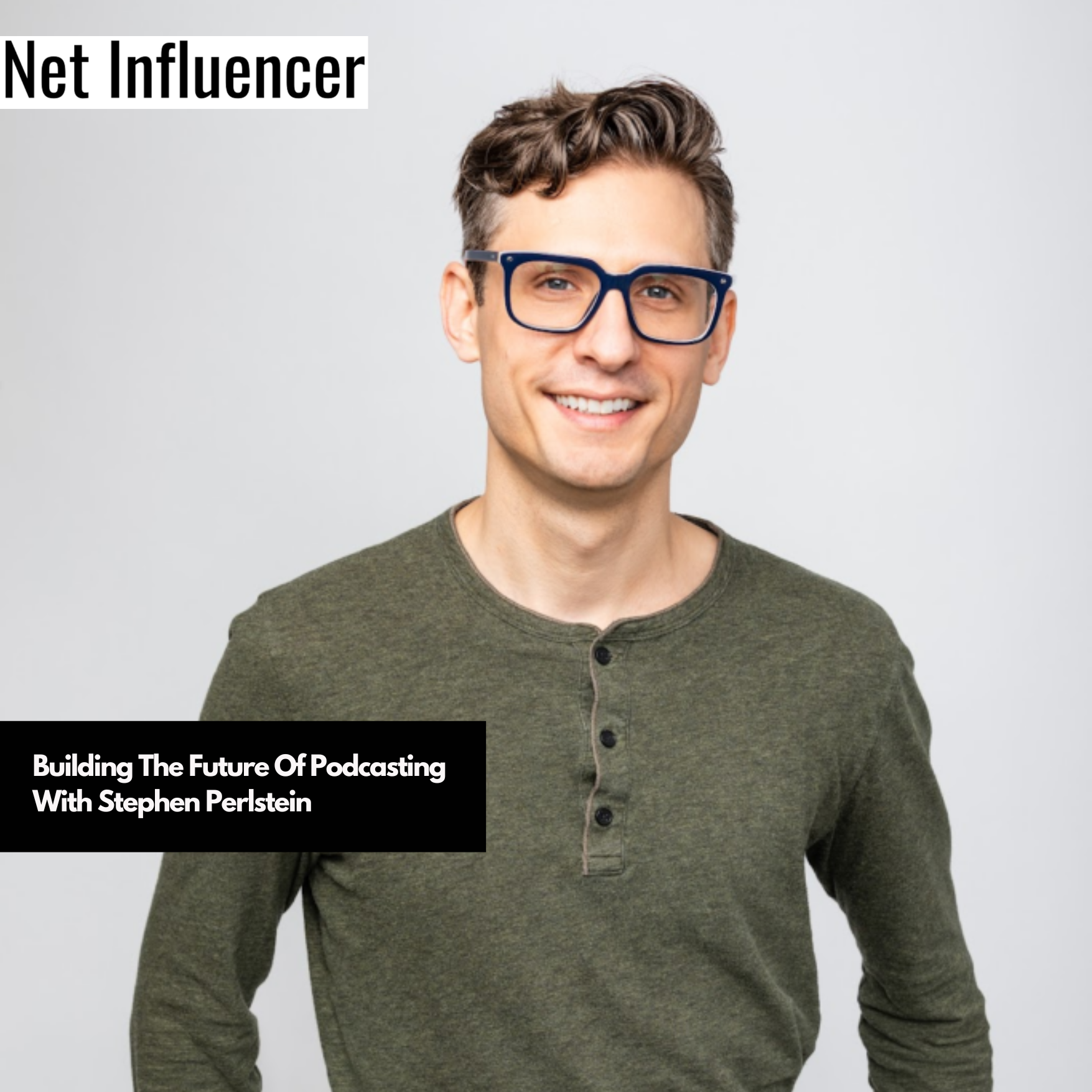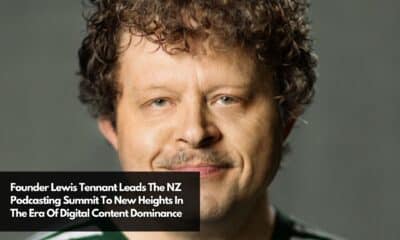Influencer
Building The Future Of Podcasting With Stephen Perlstein

Stephen Perlstein, SVP of Business Development at Libsyn, has spent over a decade helping transform podcasting from a niche medium into a mainstream powerhouse. Through his work at one of podcasting’s pioneering platforms, Stephen has supported hundreds of creators in building sustainable podcast businesses.
From Commuter to Industry Leader
Stephen’s introduction to podcasting began during his daily commute. “I used to have a very long commute when I was first out of college, and I hated everything on the morning radio,” he recalls. “Then somebody introduced me to a podcast, and I said, ‘This is the greatest thing ever.'”
This discovery sparked a passion that would shape his professional path. “As an avid consumer, I became a creator of podcasts,” Stephen explains. “Working in Los Angeles, I knew and still know many creative people who wanted help getting into the podcast space. I always was so happy to help great creatives get their work out there.”
This natural progression from enthusiast to enabler guided him through positions at Feral Audio and Studio71 before he joined Libsyn, where he now directs podcast distribution and monetization.
Direct Connections in Digital Media
Stephen notes that podcasting stands out through unique audience relationships. “From a creator’s perspective, you’re not working through an algorithm that you might run into on other more algorithm-led platforms like Instagram or TikTok. It’s a very direct connection to the audience,” he explains.
The industry veteran argues that this directness creates strong listener relationships. “You’re in their ears; people listen to the creators’ words. It’s a very close relationship,” he notes. “I’m a podcast junkie, and there are millions of people just like me, listening to their favorite podcasters for hours and hours every week.”
The impact extends beyond audience engagement. “From an attention perspective and a brand perspective, that close connection is valuable,” Stephen adds. “So more money flows into the space, more attention flows. And top creators, whom you may call legacy creators, also see there’s value in building a close relationship with their listeners and their audience via podcasting.”

Image credit: Libsyn
Tackling Technical Challenges
While podcasting offers unique opportunities, new creators face specific technical hurdles. “Podcasting can take a little bit more work,” Stephen acknowledges. “When you set up an Instagram account, it’s very easy. You post, and it’s done. [Podcasting] requires setting up RSS feeds and getting them into Apple, Spotify, and all the publishing platforms people listen to.”
Stephen explains how Libsyn, drawing on 20 years of experience, supports creators on that front: “We have a world-class tech support team who can make it easy to get your podcast online and in front of listeners everywhere. On the creative side, I enjoy spending time with creators, discussing their shows—how they plan for their first episode, their 500th, and everything in between.”
Beyond technical aspects, Stephen notes that creators often worry about content sustainability or the “fear that they don’t have enough to talk about or that they have enough content for one idea, but it turns out they have to figure out a way to broaden it.”
Creating Sustainable Content
Stephen stresses that success requires planning beyond initial episodes and posing one essential question: “What’s going to inspire you to keep on having a conversation week over week?”
“For sports, it’s easy to find inspiration talking about weekly games,” he adds. “But if it’s about relationships, maybe you need more to fuel the show. You look into taking listener questions. Maybe you can browse Reddit and find the most dramatic stories about relationships for the week and use them as inspiration for content. But what’s going to fuel the show for hundreds of episodes? I think that’s a question that you want to answer.”
Visual presentation plays a crucial role. “How do you convey what your podcast is about more clearly to your audience with your podcast’s title and cover art?” Stephen emphasizes.
He provides an example: “If we’re talking about setting sports betting lines, I’d want to call it the BettingExpert’s ‘The Football Betting Pod.’ And then maybe I would put something like an odds sheet on my cover art and something that resembles gambling on my cover. It tells my audience what they’ll get from the show.”
For creators expanding from other platforms, Stephen offers specific guidance: “If you’re a traditional YouTube, Instagram, or TikTok creator who’s thinking about launching a podcast, that’s a sign that you’re ready if people are interested in what you’re saying. Not what you’re showing.”
He elaborates on this distinction: “Sometimes people get confused. They have a lot of engagement, followers love their photos, but if they’re not talking about their opinions, they might not have connected with the audience on a spoken-word level.”
Stephen recommends research before launching: “You should listen to some podcasts. You don’t have to copy. You don’t have to listen to a podcast like yours to understand what it feels like and know the space.”
He notes this step is often overlooked: “I’ve talked to people who want to start a podcast who’ve never listened before, and I think it’s challenging to match that format. It’s not the same as radio; it’s not the same as YouTube. It’s just kind of a different medium.”
Revenue Opportunities
The industry now provides multiple income streams. Stephen outlines three main approaches:
“The easiest to access podcasting monetization strategy is through advertising,” he explains. “We have an incredible program called Libsyn Automatic Ads where we run programmatic ads for our podcasters, and they earn money right away by working and putting out their show, which I love.”
Host-read advertising offers significant potential. “That’s where a creator says, ‘Hey, I loved X brand. Come check it out. Use my promo code,'” Stephen describes. “That’s effective. And I think as a podcast matures, it can be worth quite a bit of money. I’ve seen traditional YouTube and Instagram creators have podcasting host-read ads eclipse other revenue lines in their business.”
Premium content presents another option, though timing matters. “People pay through Patreon or Supercast to have extra episodes of the show,” he notes. “Usually, you want to have a slightly mature show before you ask for extra money directly from your audience. But it can be effective.”
Podcasting also supports broader business goals. “If you’re a creator like Ali Abdaal, who I love and who has his part-time YouTuber Academy course, he can market that course through his podcast, and that converts people over to buyers. You can support touring; you can support merch. Podcasting can support other businesses and make them effective in various ways.”
Industry Trends
Stephen observes new developments that are reshaping podcasting. “Podcasts are getting longer, which can be good and bad,” he says. “As podcasts get longer, creators should think about how to continue to engage their listeners and not mindlessly drone on.”
YouTube’s influence particularly interests him. “I enjoy many things that YouTube is adding to the podcast space,” he notes. “It’s important to pay attention to how YouTube works, how thumbnails are surfaced, and those algorithms, as well as comments and community engagement. It’s a great place to connect with new podcast listeners.”
For emerging podcasters, Stephen highlights value creation: “Hopefully, you’re creating value for your listeners’ lives. That’s ultimately what we’re all trying to do, and that can be anything from having a well-researched podcast that gives people helpful information to live better to just making people laugh and feel better about their day.”

Image credit: Libsyn
A Platform for Every Creator
Libsyn’s approach reflects Stephen’s commitment to accessible podcast creation. “Libsyn has a space for everybody who wants to be in podcasting, and not all companies and businesses do,” he states, adding that this inclusive strategy combines technical infrastructure and monetization tools to support creators at every stage.
“I love the connection that it makes with its audience, the patience people exhibit when listening, and the dedication that creators have to show by building week over week,” Stephen concludes. “More people listen to podcasts than watch television. There’s so much attention there… I think it’s the place to be, and I think it’s a wonderful platform.”





















